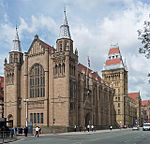Martin Schröder (chemist)
Martin Schröder | |
|---|---|
| Born | 1954 (age 66–67) |
| Education | Slough Grammar School |
| Alma mater | University of Sheffield (BSc) Imperial College London (PhD) |
| Awards | Royal Society Wolfson Research Merit Award (2005) |
| Scientific career | |
| Fields | Inorganic chemistry[1] |
| Institutions | University of Manchester University of Nottingham University of Cambridge ETH Zurich University of Edinburgh |
| Thesis | Reactions of oxo complexes of osmium and ruthenium (1978) |
| Doctoral advisor | William P. Griffith[2] |
| Doctoral students | Sihai Yang,[citation needed] |
| Influences | Jack Lewis[citation needed] Albert Eschenmoser[citation needed] |
| Website | www |
Martin Schröder FRSE FRSC MAE in an inorganic chemist.[1] He is Vice President and Dean for the Faculty of Science and Engineering and Professor of Chemistry in the Department of Chemistry at the University of Manchester since June 2015.[3] He served previously as Executive Dean of the Faculty of Science from 2011 to 2015 and Professor of Inorganic Chemistry at the University of Nottingham from 1995 to 2015.
Early life and education[]
Martin Schröder was born in Taplow, Berkshire of Estonian refugee parents in 1954,[4] and was educated at Montem Primary School and Slough Grammar School. He is first in family to attend university, and was awarded a Bachelor of Science degree in Chemistry from the University of Sheffield in 1975 and a PhD and DIC from Imperial College London in 1978 where his research on oxo complexes of osmium and ruthenium was supervised by Professor William P. Griffith.[2]
Career and research[]
After postdoctoral fellowships at the ETH, Zürich with Professor Albert Eschenmoser,[citation needed] funded by a Royal Society-Swiss National Foundation Fellowship, and at the University of Cambridge with Professor Jack Lewis, Lord Lewis of Newnham, he was appointed to a Senior Demonstratorship at the University of Edinburgh in 1982.[citation needed] He was subsequently[when?] promoted to Lecturer, Reader and then Professor, and in 1995 was appointed to the University of Nottingham as Head and Professor of Inorganic Chemistry. He served as Head of the School of Chemistry at the University of Nottingham from 1999-2005,[5] and as Executive Dean of the Faculty of Science (2011-2015).[citation needed] In 2015 he moved to his current position as Vice-President and Dean of the Faculty of Science and Engineering and Professor of Chemistry at the University of Manchester. In 1994 he was elected Fellow of the Royal Society of Edinburgh (FRSE) and Fellow of the Royal Society of Chemistry (FRSC), and in 2016 he was elected Member of Academia Europaea (MAE). He is currently from 2021 a Member of Council of EPSRC.[6]
He has been a Visiting Professor at the University of Toronto, Canada, the University of Otago, Dunedin, New Zealand and the Université Louis Pasteur, Strasbourg, France, and has published over 540 publications and patents.[citation needed] He has held a Leverhulme Trust Senior Research Fellowship, and has Honorary Degrees from Tallinn Technical University and from Nikolaev Institute of Inorganic Chemistry, Russian Academy of Sciences.[citation needed] In 2020, he was awarded the Nyholm Prize for Inorganic Chemistry by the Royal Society of Chemistry.[7]
His early independent research focussed on the chemistry of transition metal thioether and aza macrocyclic complexes with particular focus on the stabilisation of unusual oxidation state species.[citation needed] This work led to the isolation and characterisation of unique mononuclear M(I)/(III) (M = Ni, Pd, Pt) and M(II) (M = Ag, Au, Rh, Ir) complexes.[citation needed] His current research focuses on the development of new advanced functional materials, particularly metal-organic framework materials for selective fuel and toxic gas capture, purification and catalysis.[citation needed]
References[]
- ^ Jump up to: a b Martin Schröder publications from Europe PubMed Central
- ^ Jump up to: a b Schröder, Martin (1978). Reactions of oxo complexes of osmium and ruthenium. london.ac.uk (PhD thesis). Imperial College London (University of London). hdl:10044/1/8148. OCLC 500557068. EThOS uk.bl.ethos.471806.

- ^ Anon (2015). "New Vice-President and Dean for EPS faculty". manchester.ac.uk.
- ^ GRO Register of Births: JUN 1954 6a 541 ETON - Martin Schröder, mmn = Kruus'na
- ^ Anon (2013). "Martin Schroder at the University of Nottingham". nottingham.ac.uk. University of Nottingham. Archived from the original on 16 July 2013.
- ^ https://epsrc.ukri.org/about/people/martin-schroeder1/
- ^ "Professor Martin Schröder | Nyholm Prize for Inorganic Chemistry winner 2020". Royal Society of Chemistry. Retrieved 16 December 2020.
- 1954 births
- Alumni of the University of Sheffield
- Alumni of Imperial College London
- Fellows of the Royal Society of Chemistry
- Fellows of the Royal Society of Edinburgh
- Academics of the University of Nottingham
- Academics of the University of Edinburgh
- Members of Academia Europaea
- People educated at Upton Court Grammar School
- Living people
- British people of Estonian descent
- British chemists
- Inorganic chemists
- British chemist stubs
